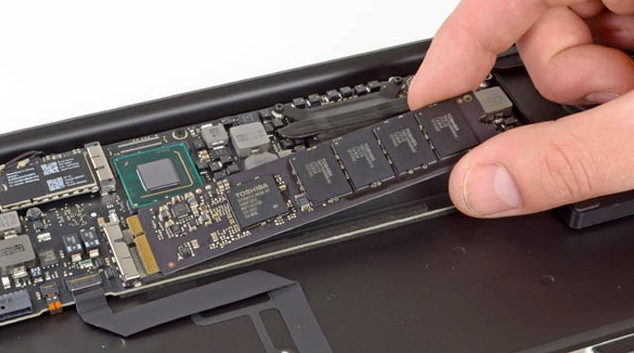Apple has unveiled a new revision of the MacBook Air that is sure to fuel the fires in the ongoing Ultra wars.
Just when PC manufacturers are all climbing aboard the SSD caching train for both performance and capacity, Apple introduces a new MacAir that contains not only a 512GB SSD, but also, a Toshiba branded ‘LSI SandForce Driven’ one that is sure to be lightning fast. Add to that 8GB RAM and standard USB 3.0 and the MacAir has just gotten new appeal.
First off, credit where credit is due and check out the new Macbook Air teardown at IFixit.com where it shows you a closeup of the new Toshiba ‘gumstick’ SSD in use. It shows the new Toshiba 512GB SSD with the SandForce name clearly printed on the SSD itself.
Although we have seen Toshiba rebranding of such in the past, this is the first we have seen LSI SandForce to allow alteration of the branding on their FSP’s and the one pictured just has to be an SF-2281 processor. Add the Toshiba Toggle Mode premium NAND flash memory to this and this SSD is sure to be the cream of the crop for Toshiba.
Checking out posts, and the above picture compliments of OWC, we see that the Toshiba SSD is actually listed as a THNSN5128GMFP and Kristian Vatto from AnandTech dug up the THNSN spec sheet where the performance is described, although the appearance doesn’t really match what we are seeing here. Where we might typically see LSI SandForce speeds of over 500MB/s read and write performance along with around 85,000 IOPS at low 4k random write disk access, these specs list something significantly lower at 520MB/s read and 350MB/s write, something we might normally see from a Marvell controller.
Although definitely a substantial price upgrade from those SSD caching ultrabooks that we learned of at Computex, this sure throws a cog in the wheel and we will definitely see some reconsideration with respect to ultrabook storage in the near future. ASUS, as an example, is the only that presently uses a similar ‘gumstick’ form factor which is capable of up to 512GB capacities and, through their relationship with our friends at ADATA, don’t be surprised if this occurs relatively soon. It is a very wise business decision after all. Myself, I wonder why they never took my word for it originally when I suggested that SSD proprietary systems with capacity would be the future.
Have a good morning all and there must be a change in the new world order! After all, how often would you see me up so early rushing out a post that credits my arch rival Apple with a job well done?
UPDATE
For those that just have to have things now, the MacBook Air is not available just yet but we did find the MacBook Pro with 512GB SSD and Retina Display at Amazon:
Apple MacBook Pro MC975LL/A 15.4-Inch Laptop with Retina Display![]()
 The SSD Review The Worlds Dedicated SSD Education and Review Resource |
The SSD Review The Worlds Dedicated SSD Education and Review Resource | 


A quick incompressible bench will tell the tale…imo it’s gonna be a Marvell.
So does this use the standard mSATA connector or some Apple proprietary SSD connector that again makes upgrading a costly exercise for the consumer?
And though proprietary may seem like the future to some, it is definitely not a good thing for the consumer.
There is a small wire switch between the Mac mSATA interface and that of regular SSDs. A Mac SSD cannot be installed into a PC and likewise the other way around, as I have been told. I have never tried this though as I have been steadfast PC guy for several years waging the PC war against Apple.
Today, the earth stopped. We have this very Ivy Bridge i7/8GB/256GB SSD Mac Air on the way to our site as I am following through on a dare that has been several years in the making. No doubt that I will definitely switch off the MacAir blade or ‘gumstick’ SSD for that of same design in my Zen just to validate what I have stated above.
In order to meet the very real demands of making small hardware – proprietary connectors, sizes, interfaces, and form factors need to be used.
Regarding compression.. Sandforce stuff is just plain bastardized, so many non standard cheats are used that these aren’t going to stand the test of time. And it begins with piss-poor benchmarks for compressed files!